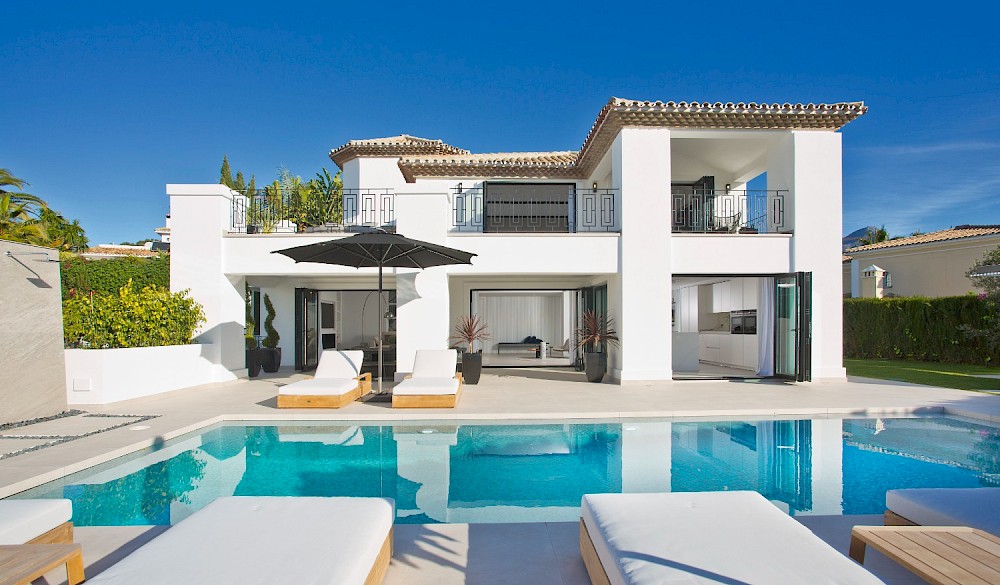Did you know that Spain's property market is experiencing a surge in popularity? With its stunning coastline, vibrant culture, and favorable climate, it's no wonder that more and more people are seeking to invest in Spanish real estate! But navigating the purchasing process can feel overwhelming, especially for foreign buyers. That's where we come in! This comprehensive guide breaks down the essential steps involved in buying property in Spain in 2024, offering valuable insights and expert advice to ensure a smooth and successful transaction. Let's get started!
Understanding the Spanish Property Market
Before diving into the purchasing process, it's crucial to familiarize yourself with the nuances of the Spanish property market. This knowledge will empower you to make informed decisions and find the perfect property that aligns with your dreams and investment goals.
Market Trends: A Bird's-Eye View
Spain's property market is dynamic, with prices and demand influenced by a variety of factors. While popular areas like the Costa del Sol and the Balearic Islands continue to attract significant interest, emerging regions are also gaining traction.
Coastal Hotspots:
Costa del Sol: This sun-drenched region, home to glamorous Marbella, vibrant Malaga, and charming coastal towns like Estepona and Fuengirola, remains a top choice for those seeking a luxurious lifestyle, beautiful beaches, and a thriving international community. Properties range from modern apartments with sea views to sprawling villas nestled in exclusive gated communities with golf courses and private amenities. The Costa del Sol also boasts excellent infrastructure, international schools, and a vibrant cultural scene. To get more detailed overview of the region, its lifestyle, and specific neighborhoods, you might want to check our latest blog post about Marbella Neighborhood Guide for New Homebuyers.
Balearic Islands: Mallorca, Ibiza, and Menorca offer stunning scenery, idyllic beaches, and a more laid-back atmosphere. Mallorca boasts diverse landscapes, from the Serra de Tramuntana mountains to picturesque coves like Cala Mesquida. Ibiza is renowned for its vibrant nightlife, exclusive villas, and stunning beaches like Playa d'en Bossa. Menorca offers a tranquil escape with pristine beaches like Cala Macarella and charming fishing villages like Binibeca Vell.
Canary Islands: Located off the coast of Africa, the Canary Islands offer year-round sunshine and dramatic volcanic landscapes. Tenerife, the largest island, offers diverse microclimates and attractions like Mount Teide National Park. Gran Canaria boasts stunning beaches like Maspalomas and a bustling capital city, Las Palmas. Lanzarote offers a unique volcanic landscape, charming villages, and a focus on sustainable tourism.
Urban Appeal:
Barcelona: This cosmopolitan city attracts buyers with its rich culture, stunning architecture (Gaudi!), and vibrant atmosphere. The property market offers a mix of modern apartments, renovated historic buildings in areas like El Born and the Gothic Quarter, and stylish penthouses with rooftop terraces. Barcelona also boasts excellent transport links, world-class dining, and a thriving arts scene.
Madrid: Spain's capital city boasts a thriving job market, world-class museums like the Prado and Reina Sofia, and a vibrant nightlife. Properties range from grand apartments in historic buildings in Salamanca and Chamberí to modern developments in the city's expanding suburbs. Madrid offers excellent infrastructure, green spaces like Retiro Park, and a cosmopolitan atmosphere.
Valencia: This coastal city offers a blend of history, culture, and modern amenities. Its property market features a mix of apartments, townhouses, and villas, with increasing interest in renovated properties in the city's historic center, El Carmen. Valencia is known for its City of Arts and Sciences, beautiful beaches like Malvarrosa, and its delicious paella.
Rural Retreats:
Andalusia: This southern region is known for its charming whitewashed villages, olive groves, and flamenco culture. Rural properties include traditional fincas (country estates), cortijos (farmhouses), and charming village houses. Popular areas include the Alpujarras mountains, the Axarquía region, and the white villages of Cádiz province.
Catalonia: The Catalan countryside offers picturesque landscapes, vineyards in the Penedès region, and medieval villages like Besalú and Peratallada. Stone houses, farmhouses (masias), and rustic villas are popular choices for those seeking a tranquil retreat.
Galicia: This northwestern region boasts lush green landscapes, charming coastal towns like Santiago de Compostela and Baiona, and a unique Celtic heritage. Rural properties include stone houses, pazos (manor houses), and coastal cottages.
Property Types in Demand:
Villas: Spacious villas with private pools, gardens, and stunning views remain highly sought-after, particularly in coastal areas and exclusive residential communities. Features like outdoor kitchens, terraces, and guest accommodations are highly desirable. Our latest article on Buying a Villa in Costa del Sol will provide more information about buying villas in the Costa del Sol and showcase examples of luxury villas.
Apartments: Modern apartments with convenient amenities, balconies, and communal pools are popular in urban centers and tourist areas. Penthouses with rooftop terraces and duplex apartments are also in high demand.
Fincas: Traditional fincas (country estates) offer a unique blend of rustic charm and modern comforts. They often feature spacious grounds, olive groves, or vineyards, and offer potential for rural tourism or equestrian activities.
Townhouses: Charming townhouses with traditional features and central locations are popular in historic towns and cities. They often offer a combination of living space, outdoor patios, and rooftop terraces.
Keep in mind: Market trends can shift, so staying informed about current conditions is essential. We recommend consulting with a local real estate expert like Asset Folio to gain valuable insights into specific regions and property types.
Factors Influencing Property Prices
Understanding the key factors that influence property prices in Spain will empower you to make informed decisions and negotiate effectively.
Location, Location, Location: As with any real estate market, location plays a crucial role. Prime locations with desirable amenities, proximity to the coast, stunning views, or excellent transport links command higher prices. Properties within walking distance to beaches, shops, and restaurants are particularly desirable.
Property Size and Condition: Larger properties in excellent condition generally have higher price tags. Factors like the number of bedrooms, bathrooms, outdoor space, and overall quality of construction influence value. Newly built or recently renovated properties tend to command higher prices compared to older properties requiring renovation.
Proximity to Amenities: Easy access to amenities such as schools, shops, restaurants, healthcare facilities, and transportation links can significantly impact property prices. Properties located in well-established communities with good infrastructure and amenities are generally more desirable.
Economic Conditions: The overall health of the Spanish economy, interest rates, inflation, and government policies can affect property values. Periods of economic growth and low interest rates tend to stimulate demand and drive up prices.
Tourism: Areas with strong tourism industries often see higher property prices due to increased demand for holiday homes and rental properties. Coastal areas and popular tourist destinations tend to have higher property values.
Supply and Demand: The balance between the number of properties available and the number of buyers seeking to purchase can influence prices. In areas with high demand and limited supply, prices tend to be higher.
Local Regulations and Planning: Local regulations and planning restrictions can impact property values. For example, restrictions on building heights or development in certain areas can affect supply and influence prices.
Tip: Conduct thorough research and compare prices in different areas to gain a realistic understanding of market values. Utilize online property portals, consult with local agents, and attend property viewings to gather valuable information.
Legal Framework for Foreign Buyers
Good news! Foreigners can legally purchase property in Spain. However, it's essential to be aware of the legal framework and requirements to ensure a smooth and legally sound transaction.
NIE Number: You'll need to obtain a NIE number (Número de Identificación de Extranjero), a tax identification number for foreigners. This is necessary for various transactions, including opening a bank account, purchasing property, paying taxes, and signing contracts. You can apply for a NIE number at a Spanish consulate in your home country or at a police station in Spain. The application process typically involves submitting required documentation, such as your passport, proof of address, and reason for requiring a NIE number.
Property Ownership Rights: Spain has a well-defined legal system governing property ownership. Foreigners have the same property rights as Spanish citizens, including the right to buy, sell, and inherit property. However, it's important to be aware of specific regulations that may apply to foreign buyers, such as restrictions on purchasing property in certain protected areas.
Legal Counsel: It's highly recommended to engage a qualified lawyer specializing in property law to guide you through the legal aspects of the purchase. They can help you understand your rights, review contracts, conduct due diligence, ensure a smooth and legally sound transaction, and represent your interests throughout the process. A lawyer can also advise you on tax implications and any legal requirements related to your specific circumstances. For more detailed information about legal requirements and potential pitfalls for foreign buyers in Spain, you might want to read our article on Legal Requirements for Purchasing Property in Spain.
The Purchasing Process: Step-by-Step
Buying property in Spain involves a series of key steps, each with its own considerations and requirements. Understanding this process will help you navigate the journey with confidence.
1. Finding Your Dream Property
Define Your Needs and Preferences: Start by clearly defining your needs and preferences. Consider factors such as location (urban, rural, coastal), property type (villa, apartment, townhouse, finca), size, budget, desired amenities (pool, garden, terrace), and lifestyle preferences (proximity to beaches, golf courses, schools, etc.).
Engage a Reputable Real Estate Agent: Working with a reputable real estate agent can save you time and hassle. They can provide valuable local market knowledge, access to a wide range of properties, schedule viewings, and guide you through the purchasing process. Look for an agent with experience in the specific area you're interested in and who understands the needs of foreign buyers. For more guidance on choosing the right agent and navigating the buying process, check our latest guide here: How to Choose the Right Real Estate Agent.
Utilize Online Property Portals: Explore online property portals to browse available properties, refine your search based on your criteria, and compare prices. Popular portals include Idealista, Fotocasa, and Rightmove Overseas. These portals allow you to filter your search by location, property type, budget, and other criteria.
Attend Property Viewings: Once you've shortlisted potential properties, schedule viewings to get a firsthand look at the properties and their surroundings. Take note of the condition, features, and any potential issues. Ask questions about the property's history, recent renovations, and any potential costs associated with maintenance or repairs.
2. The Reservation Agreement
Securing the Property: Once you've found the perfect property, you'll typically sign a reservation agreement. This document secures the property and "freezes" the purchase price, preventing other buyers from making an offer. It demonstrates your serious intent to purchase the property.
Negotiating the Price: The reservation agreement provides an opportunity to negotiate the purchase price and any other terms of the sale. Your real estate agent can assist you with this process, offering advice on market values and negotiating strategies.
Understanding the Terms: Carefully review the reservation agreement, paying close attention to the deposit amount (usually around €3,000 to €6,000), the timeframe for completion, and any contingencies. Ensure you understand the terms regarding the return of your deposit if the purchase falls through due to specified reasons.
3. Legal Due Diligence
Ensuring Legal Status and Condition: This crucial stage involves conducting thorough checks to ensure the property's legal status and condition. It's essential to protect yourself from potential legal issues or unexpected costs.
Title Searches: Your lawyer will perform title searches at the Land Registry to verify ownership, identify any mortgages or charges on the property, and ensure there are no legal disputes or encumbrances. This confirms that the seller has the legal right to sell the property and that there are no outstanding debts or legal issues associated with it.
Contract Review: Your lawyer will review the purchase contract (Escritura) to ensure it protects your interests and complies with Spanish law. They will explain the terms and conditions of the contract, clarify any clauses that may be unclear, and negotiate any necessary amendments.
Property Survey: It's advisable to arrange for a property survey to assess the condition of the property and identify any potential issues that may require repairs or negotiations. A survey can reveal hidden defects, structural problems, or potential maintenance needs, allowing you to make informed decisions and potentially renegotiate the price or request repairs.
4. Mortgage and Financing
Exploring Mortgage Options: If you require financing, explore mortgage options available to foreign buyers in Spain. Several banks offer mortgage products specifically designed for non-residents, with varying terms, interest rates, and loan-to-value ratios. Your real estate agent or lawyer can help you find suitable lenders and navigate the mortgage application process.
Understanding Interest Rates and Fees: Compare interest rates, repayment terms, and associated fees from different lenders to find the most favorable mortgage option. Consider factors such as fixed vs. variable interest rates, early repayment penalties, and arrangement fees.
Required Documentation: Be prepared to provide documentation such as proof of income, credit history, and identification to support your mortgage application. Lenders may also require a valuation of the property to assess its value as security for the loan.
5. Signing the Contract (Escritura)
Finalizing the Purchase: The final step takes place at a notary's office. The notary acts as an impartial official who verifies the identities of the parties, ensures the legality of the transaction, and witnesses the signing of the Escritura. The notary will read the contract aloud, explain its terms, and answer any questions you may have.
Transferring Ownership: Both buyer and seller sign the Escritura (title deed), officially transferring ownership of the property. The notary will then register the transaction at the Land Registry, ensuring the legal transfer of ownership is recorded.
Paying Taxes and Fees: At this stage, you'll pay the remaining balance on the purchase price, along with associated taxes and fees, such as property transfer tax (ITP), notary fees, and Land Registry fees. Your lawyer will advise you on the exact amounts and ensure all payments are made correctly.
Essential Tips for a Smooth Property Purchase in Spain
Buying a property in Spain is an exciting adventure, but it's also a significant financial and legal transaction. To ensure a smooth and successful experience, and to truly empower yourself as a buyer, consider these essential tips:
1. Choose the Right Professionals: Your Dream Team
Assembling a team of trusted professionals is crucial for navigating the complexities of the Spanish property market. Think of it like building your "A-Team" for this important mission!
Real Estate Agent (Agente Inmobiliario): A reputable real estate agent will be your guide throughout the process. They'll provide valuable local market knowledge, access to a wide range of properties (including those not publicly listed!), and expert assistance with negotiations. They can:
Help you pinpoint properties that truly match your criteria, not just what's readily available.
Schedule viewings at your convenience and offer insights into local areas, including hidden gems and potential pitfalls.
Provide crucial information on local schools, healthcare, community vibes, and future development plans.
Key Qualities: Local expertise, a strong network, excellent communication, proven negotiation skills, and a solid understanding of the legal and financial aspects of property transactions.
Lawyer (Abogado): A lawyer specializing in property law is your legal guardian angel in this process. They are essential for protecting your interests and ensuring a legally sound transaction, going beyond the surface level:
Conduct meticulous due diligence, uncovering any hidden issues with the property or its ownership history.
Review contracts with a fine-tooth comb, explaining every clause in plain language and negotiating advantageous terms on your behalf.
Advise you on your rights and obligations under Spanish law, clarifying complex legal jargon.
Act as your representative in all legal matters, ensuring your voice is heard and your interests are protected.
Key Qualities: Specialization in property law, extensive experience with foreign buyers, strong communication skills, meticulous attention to detail, and the ability to explain complex legal matters clearly.
Mortgage Advisor (Asesor Hipotecario): Securing the right financing is key, and a mortgage advisor can be your financial strategist. They'll help you navigate the often-confusing world of Spanish mortgages:
Uncover the best mortgage options available to foreign buyers, considering your unique financial situation.
Compare interest rates, terms, and fees from various lenders, presenting you with a clear and concise analysis.
Guide you through the mortgage application process, ensuring you have all the necessary documentation and meet the requirements.
Key Qualities: Deep knowledge of mortgage products for foreign buyers, access to a wide range of lenders, the ability to explain financial terms clearly, strong communication skills, and a genuine client focus. For more information about financing options and the process of securing a mortgage in Spain, reading our guide on Guide to Financing a Property Purchase in Spain will be a big help.
Currency Exchange Specialist: Don't let currency fluctuations eat into your budget! A currency exchange specialist can be your financial shield:
Secure competitive exchange rates, ensuring you get the most out of your money when transferring funds to Euros.
Minimize transaction fees, saving you precious capital.
Offer expert guidance on currency markets, helping you understand the factors that influence exchange rates.
Provide personalized service, tailoring their advice to your specific needs and financial goals.
Key Qualities: Consistently competitive exchange rates, transparent fee structures, secure and reliable transactions, expert knowledge of currency markets, and a commitment to personalized service.
Independent Surveyor: While your lawyer will conduct legal checks, an independent surveyor provides a different kind of peace of mind:
They'll assess the property's structural integrity, identifying any potential issues that could become costly headaches later.
Their report can be invaluable when negotiating the final price, especially if repairs or renovations are needed.
This extra layer of scrutiny can prevent unpleasant surprises and ensure you're making a sound investment.
Tip: Don't rely solely on online searches. Tap into your network! Ask for recommendations from friends, family, or other expats who have purchased property in Spain. Word-of-mouth referrals can be invaluable.
2. Understand the Costs: Beyond the Purchase Price
When budgeting for your Spanish property purchase, think of it like an iceberg – the purchase price is just the tip! It's essential to factor in all associated costs that lurk beneath the surface:
Property Transfer Tax (ITP): This tax applies to resale properties and varies by region, typically ranging from 6% to 10% of the purchase price. Ouch!
VAT (IVA): For new-build properties, VAT is currently 10% of the purchase price.
Stamp Duty (AJD): This tax applies to both new-build properties and mortgages, typically around 1.5% of the purchase price or mortgage amount.
Notary Fees: These cover the services of the notary public who oversees the signing of the Escritura, typically around 0.5% to 1% of the purchase price.
Land Registry Fees: These are for registering the property in your name at the Land Registry, usually a few hundred Euros.
Legal Fees: These cover your lawyer's services, which can vary depending on the complexity of the transaction and the lawyer's experience.
Mortgage Fees: If you're obtaining a mortgage, be prepared for arrangement fees, valuation fees, and other associated costs.
Property Survey: The cost of a property survey, while an additional expense, is a wise investment that can save you from costly surprises down the road.
Renovation Expenses: If you're envisioning a dream makeover for your new Spanish home, be sure to factor in the cost of renovations, from cosmetic upgrades to major structural work.
Insurance: Protect your investment with property insurance, including building and contents coverage.
Ongoing Costs: Don't forget about the ongoing expenses of owning a property in Spain, such as annual property taxes (IBI), community fees (if applicable), utilities (electricity, water, gas), and maintenance.
Tip: Create a detailed spreadsheet to track all anticipated costs. Obtain a comprehensive breakdown from your real estate agent and lawyer to avoid any financial surprises and ensure you have sufficient funds to cover all expenses.
3. Negotiate Effectively: Secure the Best Deal
Negotiation is an art, and in the Spanish property market, it can make a significant difference in the final price you pay. Don't be shy about advocating for yourself!
Become a Market Expert: Thoroughly research the market value of comparable properties in the area. This knowledge is your ammunition in negotiations.
Identify Your Leverage: Does the property have any drawbacks? Has it been on the market for a while? These factors can give you leverage to negotiate a lower price.
Be Prepared to Walk Away: This demonstrates your seriousness and can sometimes motivate the seller to reconsider their position.
Think Beyond the Price Tag: Negotiations can also involve non-price terms, such as including furniture or appliances in the sale, or requesting the seller to cover certain closing costs.
Timing is Everything: Understanding the seller's motivation (e.g., a quick sale due to relocation) can give you an advantage in negotiations.
Tip: Maintain a polite and respectful demeanor during negotiations, but also be firm and assertive in advocating for your interests. A skilled real estate agent can be your trusted advisor and negotiator, guiding you through the process and ensuring you secure the best possible deal.
4. Cultural Considerations: Respect Local Customs
Spain has a rich and vibrant culture, and demonstrating respect for local customs and etiquette can go a long way in building rapport and fostering positive relationships with sellers and professionals.
Greetings: A handshake is the customary greeting in Spain. For closer acquaintances, a kiss on each cheek is common.
Punctuality: While punctuality is generally appreciated, some flexibility is expected, especially in social settings.
Communication Style: Spaniards tend to be more indirect in their communication style than some other cultures. Pay attention to non-verbal cues and body language, and be prepared for a more relaxed approach to time.
Relationship Building: Building rapport and trust is important in Spanish business culture. Take the time to get to know the people you're working with on a personal level. Sharing a meal or coffee can be a great way to establish a connection.
Bargaining: While aggressive bargaining is not as common in Spain as in some other countries, it's acceptable to negotiate politely and respectfully. Focus on building a relationship and finding mutually agreeable terms.
Dress Code: While casual attire is generally acceptable, it's advisable to dress smartly for business meetings and property viewings. This shows respect and professionalism.
Siesta Time: Many businesses close for a few hours in the afternoon for siesta. Be mindful of this when scheduling appointments or viewings.
Local Festivals: Spain has numerous local festivals and celebrations throughout the year. Embrace these cultural events and enjoy the vibrant atmosphere.
Tip: Immerse yourself in Spanish culture! Do some research on local customs and traditions before your trip. Learn a few basic Spanish phrases to show your willingness to engage with the local culture. This will not only enhance your experience but also demonstrate respect and appreciation for your new surroundings.
Why Choose Asset Folio?
At Asset Folio, we're not just another real estate agency. We're your partners in realizing your Spanish property dreams. We go beyond simply facilitating transactions; we build relationships and provide personalized guidance every step of the way. Here's why discerning buyers choose us:
1. Local Expertise: More Than Just a Map
Our team possesses in-depth knowledge of the Spanish property market, with a specialization in the Costa del Sol region. But it's more than just knowing the map. We understand the nuances of each area, from the vibrant energy of Marbella to the tranquil charm of Estepona. We can provide:
Hyperlocal Insights: We go beyond general market trends. We have our finger on the pulse of specific neighborhoods, micro-markets, and upcoming developments.
Hidden Gem Discovery: We often know about properties before they hit the market, giving you access to exclusive opportunities.
Investment Savvy: We can identify properties with strong investment potential, whether you're seeking rental income or long-term capital appreciation.
2. Proven Track Record: Success Built on Trust
Our track record speaks for itself. We have a long history of successfully assisting buyers and sellers with their property transactions. But our success isn't just measured in numbers; it's built on the trust and satisfaction of our clients.
Client Testimonials: We encourage you to read what our clients have to say about their experience with Asset Folio. Their stories are a testament to our commitment to excellence.
Repeat Business: Many of our clients return to us for their future property needs, a testament to the strong relationships we build.
Referrals: We receive a significant portion of our business through referrals from satisfied clients, a true indicator of our dedication to exceeding expectations.
3. Personalized Service: Your Journey, Your Way
We recognize that every client is unique, with different needs, preferences, and dreams. We provide personalized guidance and support throughout the entire purchasing process, tailored to your individual journey.
Dedicated Support: From your initial consultation to the final completion, you'll have a dedicated point of contact who will be there to answer your questions, address your concerns, and provide ongoing support.
Clear Communication: We believe in open and honest communication. We'll keep you informed every step of the way, explaining complex processes in plain language and ensuring you're always in the loop.
Tailored Solutions: We'll work closely with you to understand your goals, preferences, and budget, and then tailor our services to meet your specific needs.
4. Extensive Network: Unlocking Opportunities
Our extensive network is one of our greatest assets. We have access to a vast range of properties, including exclusive listings and off-market opportunities that you won't find elsewhere.
Collaboration for Success: We collaborate with a network of trusted professionals, including lawyers, mortgage advisors, currency exchange specialists, and builders, to ensure a seamless and stress-free experience for our clients.
Local Connections: We have strong relationships with local authorities, developers, and other key players in the Spanish property market, giving us access to valuable information and opportunities.
5. Commitment to Excellence: Going the Extra Mile
At Asset Folio, we're not satisfied with simply meeting expectations; we strive to exceed them. We're committed to providing a level of service that goes above and beyond.
Transparency and Integrity: We believe in honest and ethical business practices. We'll provide you with clear and transparent information, ensuring you have all the facts to make informed decisions.
Client-Centric Approach: Our clients are at the heart of everything we do. We're passionate about helping you achieve your property dreams and making your experience as positive and rewarding as possible.
Long-Term Relationships: We're not just focused on closing deals; we're committed to building long-term relationships with our clients based on trust, integrity, and mutual respect.
Ready to embark on your Spanish property journey with a team you can trust? Contact Asset Folio today for a free consultation. We're here to guide you every step of the way, ensuring your experience is smooth, successful, and truly enjoyable.
FAQs about Purchasing Property in Spain
Q: Do I need to be a resident to buy property in Spain?
A: No, you don't need to be a resident to purchase property. However, residency may be required for certain visa applications or tax benefits.
Q: What are the typical property taxes in Spain?
A: Property taxes vary by region and property type. Common taxes include property transfer tax (ITP), annual property tax (IBI), and capital gains tax if you sell the property.
Q: Can I get a mortgage as a foreign buyer?
A: Yes, foreign buyers can obtain mortgages in Spain. Several banks offer mortgage products specifically designed for non-residents.
Q: How long does the purchasing process typically take?
A: The timeframe can vary, but it generally takes between 6 to 12 weeks from finding a property to completing the purchase.
Conclusion
Purchasing property in Spain is an exciting journey! By understanding the 2024 purchasing process, seeking expert advice, and partnering with a trusted agency like Asset Folio, you can navigate the market with confidence and achieve your dream of owning a piece of Spanish paradise. Ready to take the next step? Contact us today for a free consultation!








